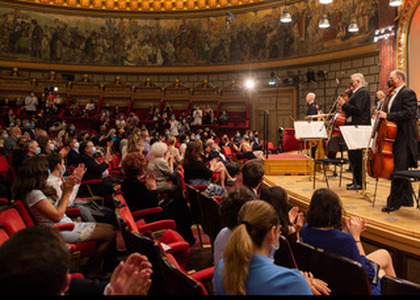> [Archived] Events

The Violin Final of the George Enescu International Competition
On Wednesday night, May 19th, 2021, at the Athenaeum, the predominantly young and numerous public welcomed the announcement made by Dmitry Sitkovetsky, the jury president of the Violin section in a burst of applause. The result of a 3-hour marathon was revealed at 9:09PM - a good quality musical performance, with strengths and weaknesses, offered by the three finalists. In the beginning, the youngest finalist, Tassilo Probst from Germany, aged 18, performed Concerto Op. 35 by Pyotr Ilyich Tchaikovsky; he proposed a rather introverted first part, in mezza-voce, exhibiting a fine art of phrasing, of the legato technique, a clear and equal timbre in all registers, without being infallible in terms of intonation, particularly in the quick passages of the high register. Despite being reserved, Tassilo Probst showed in his final move that he can also be exuberant and unleashed.
The last of the three evolutions was that of the South-Korean artist Jaewon Wee, 21: a delicate, apparently fragile physical presence, in contrast with her complete musical nature, in whom the force and the vigour originate from the harmony achieved in relation to the expressive structure of the piece: every sound it generates has a perfectly justified musical meaning, included in an overall thinking that could hardly disappoint a passionate lover of Johannes Brahms's music. Jaewon Wee did her best in Concerto Op. 77 by Brahms - one of the most demanding violin scores, and her only moments of weakness were episodically noticed in the third part of the work.
Among the three finalists mentioned above, the winner of the section was Valentin Șerban, aged 31, the age leader and obviously the most experienced and master of his discourse; he had a certain confidence that guaranteed his success, a confidence which was obvious not only in the assumption of a clear apprehension of the score, but also in every bow stroke. Last but not least, his performance was also the finest in relation to the notes from Sibelius's score - Concerto Op. 47 in D minor, seen, albeit in a tragic key, as a monolith, a fjord surrounded by the mists of the North, which the hero conquers without having the time for minor dilemmas on the way.
Valentin Șerban, in an interview given after hearing the results:
The competition was certainly atypical. The first stages were online, so it didn't necessarily feel like a competition. It was more like having two auditions. But the competition truly started now, in the semifinal.
How was it for you this evening on the stage of the Athenaeum? For example, did you feel the presence of the jury? Was it a pressure from this point of view?
It certainly was. It was not a usual concert, but I cannot say that I felt the presence of the jury so much. I only felt overwhelmed by emotions, in general.
It didn't feel like that at all. I thought you were the most present of all three finalists. What helped you get into this state?
I don't know. I don't think there is any recipe. There are all kinds of moments and I can tell that this was a good one. I've been searching for many solutions and it may or may not be a good feeling. There isn't any rule.
Why this concert by Jean Sibelius? What made you choose Sibelius, the most modern of the works chosen by the three finalists?
I don't know if I had any reasoning for that. I like it very much, it's close to my soul ,and it's an absolutely tragic piece. I could say that as tragic as the first two parts are, as fantastic is the end.
At the end of the event on Wednesday, May 19th, I also discussed with Dmitry Sitkovetsky, the jury president of the violin section. I asked him, among other things, whether he was satisfied with the final hierarchy of the section:
Yes, but I can think of at least two other violinists I would have liked to listen to in the final. They didn't get this far, as there are only three places reserved for the last stage.
Who are those two violinists?
I liked the Japanese violinist Tomotaka Seki and the one from Turkey - Azerbaijan, Elvin Hoxha Ganiyev, who performed very artistically and wonderfully. But, of course, we are talking about the vote of the majority, there can't be any decision-making intervention except in the case of equality. However, I believe Valentin Șerban had an absolutely heroic interpretation, and this goes beyond the votes. He managed to sing so beautifully and forcefully, and he was supported by the audience, who was very happy that he received the first prize, as I am very happy that it happened. Therefore, I am completely satisfied by the result not only from a musical point of view, because it is also a humanely correct decision.
Translated by Lica Alexandra,
University of Bucharest, Faculty of Foreign Languages and Literatures, MTTLC, year I
Corrected by Silvia Petrescu














